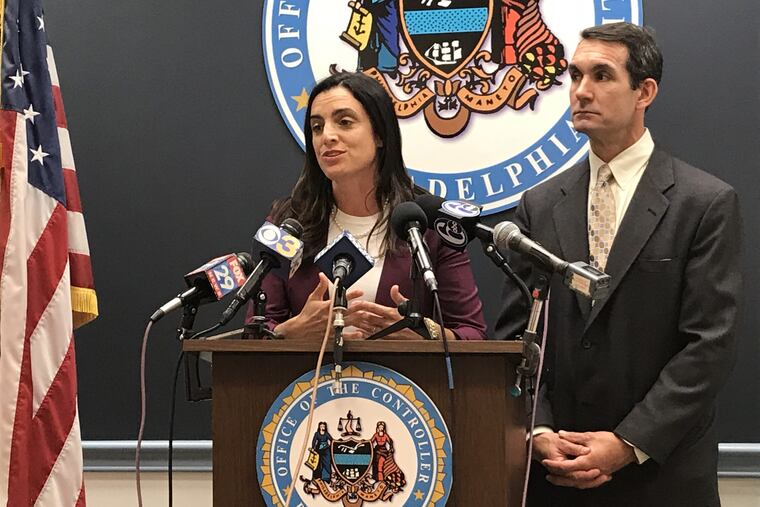Philly’s controller to audit PPA’s parking enforcement
The PPA will be the subject of a second audit of how its spends and staffs in its parking enforcement division.

Philadelphia's controller will audit the way the Parking Authority staffs and spends money on salaries for on-street parking enforcement. It will be the second major audit of PPA operations within the past year.
The street parking enforcement division brought in $135 million in fiscal year 2017, according to PPA data. Of that, about $37.4 million went to the city and $10 million to the School District. Rebecca Rhynhart, the controller, said Wednesday that she wants to look at the parking enforcement division to determine if it can reduce its expenses to provide more money for the School District.
The PPA, which is controlled by Statehouse Republicans, has a long history of patronage. Although ferreting it out is not the primary goal of the audit, Rhynhart said, it is likely to be looked at in the review, which is expected to begin in August and take seven to 10 months.
"It's not just a Republican patronage mill," Rhynhart said in a news conference Wednesday. "It's a Democrat patronage mill, too."
The audit will compare the PPA's staffing and salaries to other cities' operations, said Rhynhart, a Democrat. It also will evaluate the PPA's progress implementing the recommendations from a state audit released last year.
The on-street parking division has a budget of $133.9 million for the current fiscal year, the PPA reported. About $23 million of that goes to payroll expenses for 573 workers; $25 million covers benefits and pensions.
The PPA defended its staffing numbers Wednesday, saying the number of workers in the on-street parking division has remained consistent over the years because the work of ticketing, towing, and booting cars is labor-intensive.
The results of the audit conducted by Eugene DePasquale, the state's auditor general, and released in December 2017 found that excessive raises for top managers, credits for paid leave, and a perk-heavy workplace cost the city and the School District thousands of dollars. Meanwhile, the authority's board of directors was idle while being aware of sexual harassment accusations against its former executive director, Vincent J. Fenerty Jr.
>>READ MORE: Auditor General: Hands-off Parking Authority board allowed Fenerty to reign as 'tyrant'
"The past behaviors of the Parking Authority are clearly unacceptable," DePasquale said at Wednesday's event.
His audit offered 117 recommendations for the PPA to improve its operations. Under an executive director who took over in January, former Republican state legislator Scott Petri, the PPA says it has implemented more than 90 percent of those recommendations.
"We look forward to working with the city controller to continue making the PPA more efficient and customer-friendly," Petri said. "The PPA is committed to providing the best customer service possible by employing best industry practices and the latest technological advances."
The PPA provided $13.5 million to the School District in the recently ended 2018 fiscal year. The city again received about $37 million.
The PPA's state-mandated formula determines how money from ticket enforcement is distributed to the city and School District, and is designed to continually increase the amount the PPA must give the city if its revenue from on-street parking enforcement increases before any can be provided to the schools. If the PPA's revenue declines, the payment to the city must be no lower than the most recent year's payment and cannot decline in proportion to revenue.
In the current fiscal year, the PPA anticipates paying the city $39 million and the schools $11 million. That number is lower than the most recent payment because the PPA made some payments to the city that offset the money that would come out of the on-street parking revenue.
>>READ MORE: Was Philly's parking amnesty program worth it?
Evaluating the wisdom of that funding formula, and addressing questions about whether control of the PPA should revert from the state to the city, will not be among the audit's goals, Rhynhart said.
The PPA's contribution to the School District is a small percentage of a $3.2 billion budget, but Rhynhart said the PPA's visibility on city streets made it important to maintain accountability.
"The reason the PPA is so important," she said, "is because the PPA's on-street operations affect the people of this city on a daily basis."